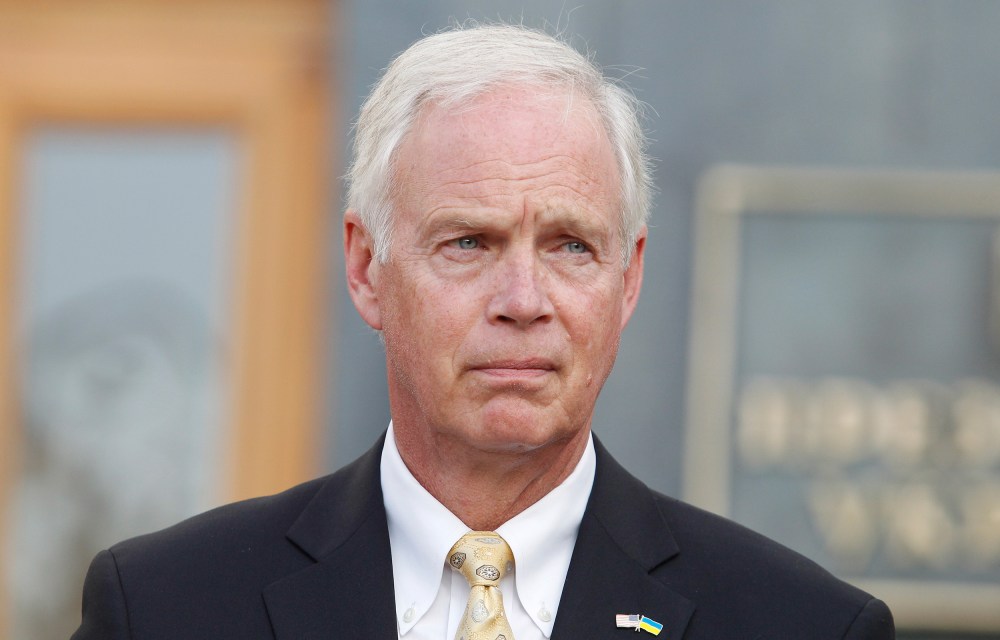Sen. Ron Johnson’s flip-flop on gay marriage was as inelegant as it was revealing.
In July, shortly after the Supreme Court overturned 50 years of settled law on abortion, Johnson, R-Wis., said he saw “no reason to oppose” federal legislation that would codify the right to same-sex marriage.
NEW AUDIO: Ron Johnson flips and says he won’t support same-sex marriage bill: “I said ‘at this point, I don’t see a reason to oppose it’ to get [media] off my back… I wouldn’t support it in its current state… I’m not happy with the Baldwins of the world opening that wound.” pic.twitter.com/ID2CFp3Ivg
— Heartland Signal (@HeartlandSignal) September 7, 2022
But just two months later he reversed course, saying that in fact he had no intention of supporting the Respect for Marriage Act “in its current state.” In explaining his volte-face, Johnson complained that he had been “hounded” by reporters and claimed he issued his news release endorsing same-sex marriage only to appease the media.
“You have to understand the process here. You’re walking down the subway in the Capitol and all of a sudden you get descended [upon] by national press,” Johnson told a conservative group this month. “You just get hounded on this crap, right? So, just to get ’em off my backs, I wrote a press release.”
There was, of course, a reason for the media interest.
The Dobbs decision has therefore suggested that essentially no settled law should be considered safe.
In his concurrence with the decision to overturn Roe v. Wade, Justice Clarence Thomas had written that the court should also revisit its decisions that legalized contraception (Griswold v. Connecticut), struck down sodomy laws (Lawrence v. Texas) and affirmed the right to same-sex marriage (Obergefell v. Hodges).
The Dobbs decision has therefore suggested that essentially no settled law should be considered safe. As a result, it’s little wonder that lawmakers moved quickly to write federal guarantees for same-sex marriage into law. Support for codifying Obergefell seemed bipartisan, with a number of Republicans — including Johnson — signaling their backing.
But in late July, social conservatives began to push Johnson hard. One of Wisconsin’s most prominent anti-gay organizations, Wisconsin Family Action, launched a campaign to persuade him to oppose the legislation, calling it “a dangerous bill.”
“It’s a direct threat to religious freedom,” Julaine Appling, the group’s president, told the Milwaukee Journal Sentinel.
Within weeks, Johnson caved.

In audio captured by the Heartland Signal, Johnson explained to a conservative group on Sept. 1 that he agreed with Thomas’ legal reasoning but insisted that even though it overturned Roe, the court would never overturn Obergefell. “Justice Thomas is probably right that [Obergefell] was wrongly decided,” he said. “But that’s a different issue as to whether or not the Supreme Court will overturn it.”
“They never will,” he said.
Johnson did seem conflicted, saying he didn’t “want to see millions of lives disrupted.” But, he insisted, merely mentioning the issue was overly divisive. “Move on, OK? We’ve got enough problems.”
And he lashed out at the bill’s proponents. “I’m not happy with the Baldwins of the world who are just opening that wound,” he said, referring to his Wisconsin colleague Tammy Baldwin, the first lesbian to be elected to the Senate.
So to summarize: Johnson was for codifying same-sex marriage before he was against it, he agrees with Justice Thomas’ argument that Obergefell had been wrong decided — and therefore unconstitutional — but he insists that there was no chance that it would ever be overturned, and he blames the media for forcing him to falsely proclaim his support.
Even the most cynical of pols cringed at this convoluted chop logic.
The New York Times columnist Bret Stephens offered a fitting political epitaph for Johnson: “His principles are lousy, and he’s not a man of principle.”












